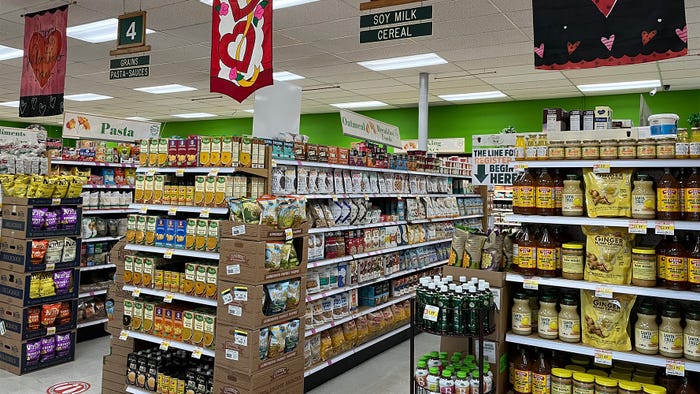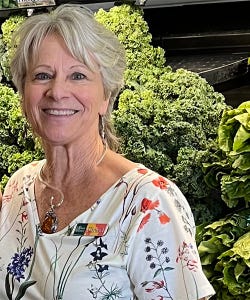March 19, 2024

When East Coast transplant Cheryl Hughes began working for pioneering SoCal health food retailer Lindberg Nutrition in 1979, she didn’t know much about natural health. But the more she learned, the more passionate she became, inspiring her to open The Whole Wheatery in Lancaster, California, in 1983.
As a new store owner, Hughes delved even deeper, earning a nutrition counseling degree and frequenting industry trade shows to learn from her forebearers and peers. Soon she joined the board of the Natural Nutritional Foods Association, now the Natural Products Association, and became a fierce advocate for supplement access. Most notably, she rallied fellow retailers and lobbied Congress for the passage of the landmark Dietary Supplement Health and Education Act of 1994.
Today, Hughes remains “part of the glue” at the Whole Wheatery, still working weekdays but as a “stepped-back overseer,” she says. Her love of the natural products industry hasn’t wavered, nor has her belief in independent retailers’ importance.

Credit: The Whole Wheatery
The Whole Wheatery turned 40 last year—congrats! What are your secrets to success?
Cheryl Hughes: First, the people that service the customers have always been outstanding. In the early days, the industry had all the knowledge, and were the people who [consumers] came to for information. We’ve never changed that particular thing about us, although customers today are much more sophisticated and educated. Now with the internet and social media, there are so many different ways people get their information, so it’s very different than in the good old glory days.
But the key for us has always been to find new products and talk about their virtues. You have your core supplement companies that people are really familiar with, and then you’re constantly expanding with new product developments. You’re explaining why it’s important to mix this product with that product and how they benefit the body in a holistic manner.
What is the impact of customers being more educated?
CH: Customers are now challenging you, asking you questions, and your staff has to be able to answer those questions and oftentimes validate why you’ve chosen to put the products on the shelf that you have. What is the story? Why is it important? That has been a truism forever, but it’s even more important now when shoppers can buy supplements everywhere for every price. It’s insanity now! As a result, the quality of supplements is grossly diluted.
What was Expo West like back in the day?
CH: We’d go to your trade show to be educated, because all of the seminars were based on training the retailers to sell the products. And there were living industry icons walking the aisles—Rachel Perry, Linus Pauling, Durk Pearson, Sandy Shaw—and you met and talked with them. They were oftentimes the creators of the products we were selling, so we had great stories to tell because we knew them personally. That small cottage industry had lovely opportunities for retailers, manufacturers, distributors, brokers, etc., to comingle on a much more personal basis.
What challenges have arisen as the industry has grown?
CH: The biggest challenge is the impersonalization of the industry. When you go from a small cottage industry where you know so many people to a big corporate industry, it’s not the same industry. Now we’re seeing a huge cutback of brokers and reps, who were the information carriers and relationship builders.
Consolidation has affected us greatly. Companies that we used to rely on have disappeared. New and different kinds of companies are coming, which is good. They care about packaging and waste and organic and biodynamic sourcing, so those things are changing for the positive. But with that, other companies fall out—which is OK because we are the industry of new products. We are the industry that ushers new products into mainstream America. We are the storytellers, the gatekeepers, the ambassadors. Without us, you can bring 1,000 products to market, but their lifespan will be very short.

DSHEA turns 30 this year. How did you help campaign for its passage?
CH: I was on the board of NNFA, and we developed, in conjunction with Roy Upton, a blackout kit called “Don’t Let Supplements Go the Way of the Dinosaur.” We distributed 500 kits all over the U.S. and called for a blackout of sales to demonstrate what would happen if access to dietary supplements was removed and they became prescription only. That was a very powerful message. I got to go testify before Congress. We all learned how to be lobbyists and lobbied in D.C. multiple times.
That must’ve been a powerful experience.
CH: When this industry has a big dramatic thing, everybody comes together—and we did. It was a beautiful, amazing thing to behold. Everybody worked together all across the U.S., and our whole campaign led to the passage of DSHEA. And still today, DSHEA is a living, breathing document that allows consumers that very critical access to make their own health decisions.
Do you worry that we now take supplement access for granted?
CH: It does scare me. Because as stores have changed hands, dinosaurs like myself are doing other things and consolidation has occurred, those messages aren’t getting passed down. And the people that are passing them down don’t have any real attachment to them or understand their significance. Today if [a threat to supplement access] happened, the same kind of grassroots efforts would have to come in. I believe there is enough human desire to control our choices that the industry and people connected to it would rise up and rally to support the right to choose.
How do independent retailers remain relevant in our increasingly digital world?
CH: You have to build trust in your community—that is the key to all of it. You don’t want to alienate the medical community. You don’t want to prescribe, diagnose, treat or cure a disease. And then it’s about having an open, honest dialogue with your customer. Talk with them very frankly about their needs, their diet and why they might be experiencing this or that, and then say, “here are some available products” and explain why they are valuable.
You can also talk about the value-added products that you carry, the brands that care about environment, farming, packaging, ingredients, non-GMO, organic. And if your staff is knowledgeable, they can talk about why particular formulas would benefit that person.
As long as we have people servicing our aisles and we tell the stories that we know to be true, then we still have a very viable message—and that trust factor is what allows us to stay relevant.
About the Author
You May Also Like
.png?width=700&auto=webp&quality=80&disable=upscale)




